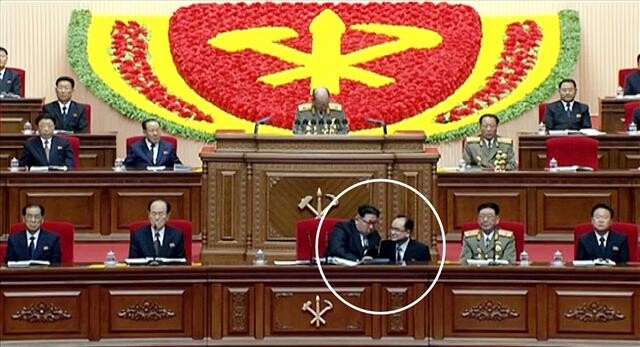hankyoreh
Links to other country sites 다른 나라 사이트 링크
[Analysis] No specific measures to mend fences with US at North Korean congress

North Korean leader Kim Jong-un’s business summation report at the Korean Workers’ Party (KWP) congress on May 6-7 included a pledge to “improve and normalize relations” with “countries that respect [North Korea’s] autonomy and treat us favorably, even if they have been in hostile relations with us in the past.”
Kim did not actually single out the US by name as a country that has been “in hostile relations.” But given Pyongyang’s past vociferous calls for Washington to abandon its “antagonistic” policies, the message‘s target appears clear.
Also noteworthy is the report’s reference to “autonomy” as a condition for improving relations, which reads as a call to acknowledge the legitimacy of Kim‘s regime in a narrow sense without attempting to trigger its collapse. It’s a message that could be seen as the key prerequisite for improving ties with Washington.
Kim‘s remarks read as a long-term strategy for foreign relations rather than a pledge to undertake any specific, immediate actions to mend fences with the US. While a practical improvement would require some degree of give and take, demands from the US accounted for a major portion of Kim’s report. In particular, it demanded an end to “antagonistic policies” toward the North, the replacement of the current armistice with a peace agreement, a withdrawal of US forces from the Korean Peninsula, and a suspension of joint military exercises with South Korea.
In contrast, the report showed little progress in answering Washington‘s demands from Pyongyang. On the issue of denuclearization, Kim pledged to “work to achieve global denuclearization.” As a response to Seoul and Washington’s demands for Pyongyang to end its nuclear program, it reads instead as a promise to work toward nuclear arms reduction as another nuclear power on equal footing with the US. It‘s a substantial difference from the US position demanding the verifiable and irreversible abandonment of the North’s nuclear program.
The report also included pledges not to use nuclear weapons first or to transfer or proliferate weapons or technology - neither of which is anything new. In that sense, the US is unlikely to regard Kim‘s report as forward-thinking.
But with Pyongyang proposing communication to explain Kim’s report to Washington in greater detail, it is possible that the US government could agree in the name of “exploratory dialogue.” Many in Washington have sensed the need to manage tensions on the Korean Peninsula amid their escalation this year. North Korea’s advancements in nuclear and missile technology have also been the subject of growing alarm within the US government.
The question of whether the Six-Party Talks on the nuclear issue can be resumed hinges on how much common ground the North and US can find in whatever exploratory dialogue takes place. Washington has stressed the need for sincere steps toward denuclearization from Pyongyang before the talks can begin again, while arguing that any peace agreement discussions must have denuclearization as a prerequisite.
By Yi Yong-in, Washington correspondent and Park Byong-su, senior staff writer
Please direct questions or comments to [english@hani.co.kr]

Editorial・opinion
![[Column] Has Korea, too, crossed the Rubicon on China? [Column] Has Korea, too, crossed the Rubicon on China?](https://flexible.img.hani.co.kr/flexible/normal/500/300/imgdb/original/2024/0419/9317135153409185.jpg) [Column] Has Korea, too, crossed the Rubicon on China?
[Column] Has Korea, too, crossed the Rubicon on China?![[Correspondent’s column] In Japan’s alliance with US, echoes of its past alliances with UK [Correspondent’s column] In Japan’s alliance with US, echoes of its past alliances with UK](https://flexible.img.hani.co.kr/flexible/normal/500/300/imgdb/original/2024/0419/2317135166563519.jpg) [Correspondent’s column] In Japan’s alliance with US, echoes of its past alliances with UK
[Correspondent’s column] In Japan’s alliance with US, echoes of its past alliances with UK- [Editorial] Does Yoon think the Korean public is wrong?
- [Editorial] As it bolsters its alliance with US, Japan must be accountable for past
- [Guest essay] Amending the Constitution is Yoon’s key to leaving office in public’s good graces
- [Editorial] 10 years on, lessons of Sewol tragedy must never be forgotten
- [Column] A death blow to Korea’s prosecutor politics
- [Correspondent’s column] The US and the end of Japanese pacifism
- [Guest essay] How Korea turned its trainee doctors into monsters
- [Guest essay] As someone who helped forge Seoul-Moscow ties, their status today troubles me
Most viewed articles
- 1[Column] The clock is ticking for Korea’s first lady
- 2Samsung barricades office as unionized workers strike for better conditions
- 3[Editorial] When the choice is kids or career, Korea will never overcome birth rate woes
- 4[News analysis] After elections, prosecutorial reform will likely make legislative agenda
- 5S. Korea, Japan reaffirm commitment to strengthening trilateral ties with US
- 6All eyes on Xiaomi after it pulls off EV that Apple couldn’t
- 7After 2 months of delayed, denied medical care, Koreans worry worst may be yet to come
- 8US overtakes China as Korea’s top export market, prompting trade sanction jitters
- 9[Column] Has Korea, too, crossed the Rubicon on China?
- 10Hong Se-hwa, voice for tolerance whose memoir of exile touched a chord, dies at 76